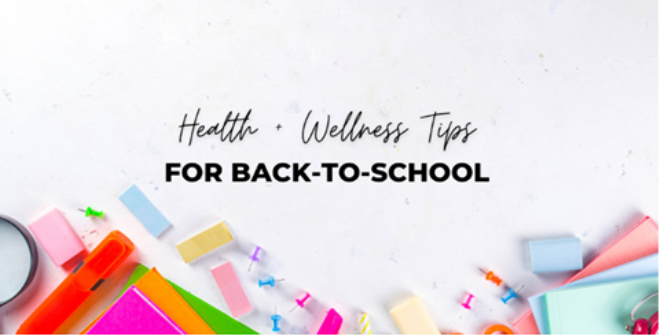
As summer break winds down, students and parents begin the transition back into the school routine.
While academic readiness is often the focus, physical and mental well-being are just as important for a successful school year.
Whether you’re preparing for elementary school or heading to college, here are some essential wellness tips to keep your health in check as you head back to school.
- Prioritize Sleep: A good night’s sleep is important for academic success and overall well-being. Establishing a consistent sleep schedule helps regulate your body’s internal clock, improving concentration, mood, and immune function. For younger students, aim for 9-11 hours of sleep, while teenagers should get about 8-10 hours. To help your body adjust, start transitioning to earlier bedtimes at least two weeks before school begins.
- Fuel Your Body with Healthy Nutrition: A balanced diet can significantly boost energy levels, focus, and mood. Start the day with a nutritious breakfast rich in protein, whole grains, and fruits. Pack lunches and snacks that include a mix of vegetables, lean proteins, and complex carbohydrates to keep energy levels steady throughout the day. Staying hydrated is also key—encourage water over sugary drinks.
- Establish a Routine: Routines help manage stress and provide structure, especially during the busy school year. Set regular times for homework, meals, physical activity, and relaxation. Creating a schedule helps students stay organized and prevents last-minute panic about assignments or extracurricular activities.
For parents, it’s a great way to manage household tasks and create predictability for children.
- Stay Physically Active: Including physical activity into your daily routine is essential for both physical and mental health. Exercise can reduce stress, improve focus, and boost mood. Encourage children to participate in sports, join physical education classes, or simply take a daily walk or bike ride. Physical activity also promotes better sleep, which is crucial for school performance.
- Focus on Mental Health: Back-to-school season can be stressful for both students and parents. It’s important to prioritize mental health by creating an open dialogue about feelings, worries, and challenges. Encourage mindfulness practices such as meditation, deep breathing, or journaling to help manage stress and anxiety. Don’t hesitate to seek professional support if needed, whether through school counselors or external mental health services.
- Manage Screen Time: With the increase in digital learning tools and devices, managing screen time is more important than ever. Set limits on recreational screen use and encourage breaks during long periods of studying or homework. Blue light exposure from screens can disrupt sleep, so it’s best to limit use of electronics before bedtime.
- Get Organized Early: Organization reduces stress and improves productivity. Help your child organize their school supplies, create a designated homework space, and keep a calendar or planner to track assignments and activities. High school and college students can benefit from digital tools like scheduling apps to stay on top of their responsibilities.
- Maintain Good Hygiene: As students return to classrooms, good hygiene practices become more critical, especially in light of recent health concerns. Teach kids to wash their hands frequently, use hand sanitizer when necessary, and avoid sharing personal items. This helps prevent the spread of illness and keeps everyone in the classroom healthy.
- Build Strong Social Connections: Healthy relationships are an important part of well-being. Encourage your child to foster positive friendships and participate in social activities. For older students, joining clubs, teams, or volunteer groups can help them build a supportive social network. Having a sense of belonging can greatly reduce feelings of isolation and stress.
- Set Realistic Expectations: Whether it’s academic performance or extracurricular activities, setting realistic and achievable goals is key to reducing stress. Encourage your child to do their best, but remind them that it’s okay not to be perfect. Celebrate successes, no matter how small, and view setbacks as opportunities for growth and learning.
Returning to school doesn’t have to be a stressful experience if wellness is made a priority. By focusing on sleep, nutrition, physical activity, mental health, and organization, students can set themselves up for a successful and healthy school year. Parents play a key role in fostering these habits, helping their children build a strong foundation for success both in and out of the classroom.
With these wellness tips, you’ll be better prepared to tackle the challenges and opportunities the school year has to offer.
References
